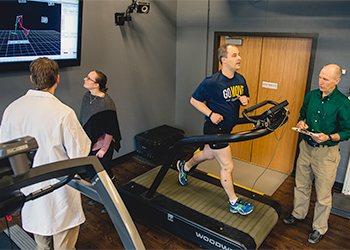Freshman admission to the Exercise Physiology undergraduate major is a direct admit process through Marquette University admissions website. We accept students as Exercise Physiology majors in their freshman year. If the student then meets minimum GPA standards and has completed all major course work with a grade of C or better, he/she is guaranteed to continue to senior year and a clinical placement.
Transfer students are welcome to apply. Transfer students are accepted into the freshman, sophomore, and junior classes as long as places are available and the transfer student has a minimum grade point average of 2.70 based on a 4.00 scale. If you are considering transferring into the Exercise Physiology undergraduate major, you are strongly encouraged to enroll in BIOL 1001 (General Biology 1), CHEM 1001 (General Chemistry 1), CHEM 1002 (General Chemistry 2), and BISC 1035 (Principles of Human Anatomy). Our students take this series of courses as freshmen in order to proceed to the sophomore-level EXPH courses. Given the established curricular sequence, a student may need summer study and/or additional time to degree completion. To discuss your options, please schedule an appointment with Ms. Yolanda Webb or Mr. Ken Knetzger.
Why choose a Marquette University Exercise Physiology degree?
- Accredited by the Commission on Accreditation of Allied Health Education Programs and honored by the National Strength and Conditioning Association's Education Recognition Program.
- Direct freshman admission.
- Personal academic advising by program faculty members.
- Our students receive placement in the highest quality clinical experiences ranging from professional sports teams to innovative therapeutic centers to cutting edge physiology research labs.
- The Exercise Physiology degree provides the student with a strong basic science base that is preparation for a variety of health and wellness fields.
- Excellent pre-med and pre-grad school preparation.
- Students have direct access to faculty, administrators, and staff.
- The program fosters opportunities for undergraduate research.
- Impressive record of student awards for presentation at state, national, and international conferences and meetings.
Program Outcomes
- Outcome 1: Apply critical thinking including evidence-based decision making in creating safe and effective exercise programming for any population. Programming considers each client’s context, culture, and interests.
- Outcome 2: Demonstrate professional competence including practice of cultural humility, effective, inclusive and context appropriate communication, community engagement, conflict resolution, leadership, and best practice and equity-informed decision making in exercise and wellness programming.
- Outcome 3: Assess any patient/client’s fitness level using multi-component fitness model, and promote wellness and behavior change to support health.

